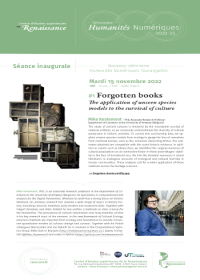
[Séminaire "Humanités Numériques] #1 Forgotten books - The application of unseen species models to the survival of culture
Date: 15 Novembre 2022
Horaire: 18h
Lieu: Site CESR (Centre d'Etudes Supérieures de la Renaissance), Salle Rapin
Organisateur : Elena Pierazzo, directrice de l'UMR CESR, Professeure en Humanités Numériques (CESR-Université de Tours)
Résumé :
Séance inaugurale du nouveau séminaire "Humanités Numériques Tourangelles" organisé par Elena Pierazzo, directrice de l'UMR CESR, Professeure en Humanités Numériques (CESR-Université de Tours).
> Lien de connexion TEAMS Microsoft
Mike Kestemont - PhD, Associate Research Professor Department of Literature at the University of Antwerp (Belgium)
 The study of ancient cultures is hindered by the incomplete survival of material artifacts, so we commonly underestimate the diversity of cultural production in historic societies. To correct this survivorship bias, we applied unseen species models from ecology to gauge the loss of narratives from medieval Europe, such as the romances about King Arthur. The estimates obtained are compatible with the scant historic evidence. In addition to events such as library fires, we identified the original evenness of cultural populations as an overlooked factor in these assemblages’ stability in the face of immaterial loss. We link the elevated evenness in island literatures to analogous accounts of ecological and cultural diversity in insular communities. These analyses call for a wider application of these methods across the heritage sciences.
The study of ancient cultures is hindered by the incomplete survival of material artifacts, so we commonly underestimate the diversity of cultural production in historic societies. To correct this survivorship bias, we applied unseen species models from ecology to gauge the loss of narratives from medieval Europe, such as the romances about King Arthur. The estimates obtained are compatible with the scant historic evidence. In addition to events such as library fires, we identified the original evenness of cultural populations as an overlooked factor in these assemblages’ stability in the face of immaterial loss. We link the elevated evenness in island literatures to analogous accounts of ecological and cultural diversity in insular communities. These analyses call for a wider application of these methods across the heritage sciences.
>> forgotten-books.netlify.app
Mike Kestemont, PhD, is an associate research professor in the department of Literature at the University of Antwerp (Belgium). He specializes in computational text analysis for the Digital Humanities. Whereas his work has a strong focus on historic literature, his previous research has covered a wide range of topics in literary history, including classical, medieval, early modern and modernist texts. Together with Folgert Karsdorp and Allen Riddell he has written a textbook on data science for the Humanities. The persistence of cultural information over long stretches of time is his key research topic at the moment. In the new framework of Cultural Ecology, empirical methods are imported from ecology and biostatistics to provide innovative quantitative models of cultural change and survival. Together with his Polish colleagues Maciej Eder and Jan Rybicki he is involved in the Computational Stylistics Group. Mike lives in Brussels (http://mikekestemont.github.io/), tweets in English (@Mike_Kestemont) and codes in Python (https://github.com/mikekestemont).
Contact :
Elena Pierazzo elena.pierazzo@univ-tours.fr et Alberto Campagnolo alberto.campagnolo@univ-tours.fr










